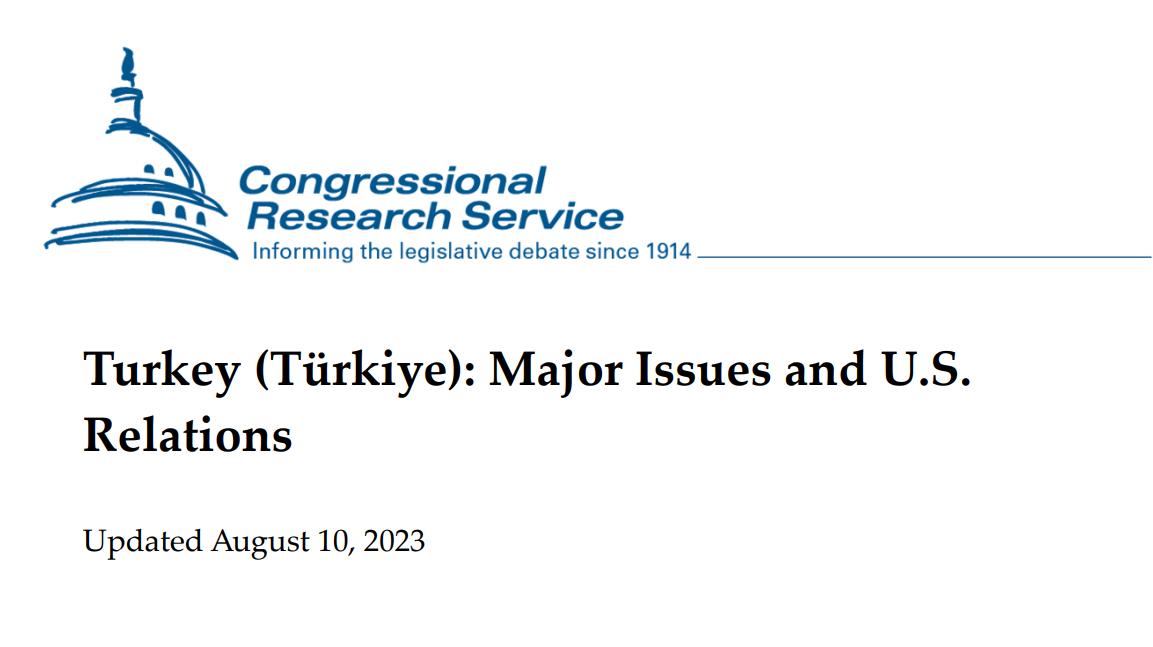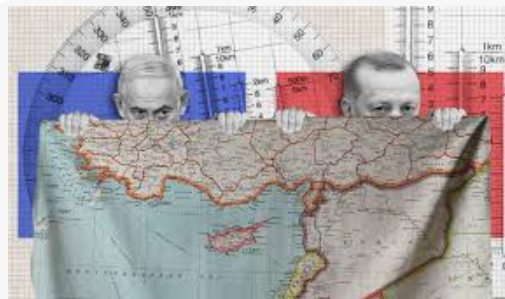Congressional Research Service: Turkey (Türkiye): Major Issues and U.S. Relations
 usa turkey report
usa turkey report
This report made pro-government daily Hurriyet’s headline today, with its Athens reporter Yorgo Kirbaki informing us that the Greek press called it a positive development in Turko-American relationship.
Here is its executive summary:
U.S. relations with Turkey take place within a complicated geopolitical environment, as Turkey also faces deep-seated economic problems and continues to recover from disastrous February 2023 earthquakes. U.S.-Turkey tensions that worsened after a failed 2016 coup in Turkey highlight uncertainties about the future of bilateral relations. Ongoing disagreements stem from U.S. support for Syrian Kurds linked to the Kurdistan Workers’ Party (Kurdish acronym PKK, a U.S.-designated terrorist organization), and Turkey’s 2019 procurement of a Russian S-400 surface-to-air defense system. Congressional action has included holds and conditions on U.S. arms sales to Turkey, as well as support for certain sanctions against Turkey. Nevertheless, U.S. and Turkish officials emphasize the importance of the bilateral relationship and Turkey’s membership in the North Atlantic Treaty Organization (NATO).
At the same time, Turkey apparently seeks to reduce its dependence on the West, as it and other “midsize powers” such as Saudi Arabia and India seek advantages in a global system with growing great-power competition. Turkey’s desire for greater strategic autonomy may partly explain its willingness to coordinate some actions with Russia, though the two countries retain significant differences on Ukraine and other issues. One analyst has argued that most of Turkey’s core security problems around its borders and coastlines—involving Syria, Iraq, Greece, Cyprus, Libya, and the Caucasus—require it to deal with Russia, Iran, and various other actors without much help from the West. Turkey’s future foreign policy course could depend partly on its leaders’ willingness to risk breaks in traditional ties with Western powers while building other global relationships.
[embed]https://www.youtube.com/watch?v=vQPolEQQ9WA&t=1s[/embed]
Congressional and executive branch action regarding Turkey and its neighboring countries could have implications for bilateral ties and U.S. political-military options in the region, as well as Turkey’s strategic orientation. Under President Joe Biden, existing U.S.-Turkey tensions have continued alongside cooperation on other foreign policy matters. In a June 2023 CNN interview, National Security Advisor Jake Sullivan said that Turkey is “charting an independent foreign policy but one in which we can have a constructive relationship with them.” While Turkey’s deepening ties with Russia remain a cause for U.S. concern, its emergence as a mediator between Russia and Ukraine after Russia’s 2022 invasion—including with regard to the shipment of grain to global markets—has arguably increased Turkey’s importance for U.S. policy. U.S.-Turkey relations also have improved due to Turkey’s support for Ukraine’s defense; its limitation of Russian naval access to and from the Black Sea; and its moves toward rapprochement with Israel, some Arab states, and Armenia.
Citing the importance of NATO strength and interoperability, President Biden has voiced support for sales that would revamp Turkey’s aging F-16 fleet, but some Members of Congress have expressed opposition. The Administration reportedly provided informal notification to Congress in January 2023 of a possible sale of F-16s to Turkey, plus associated equipment and munitions. Factors potentially influencing congressional consideration of the proposed sale include whether Turkey might approve of Sweden joining NATO, and Turkey’s tense relations with Greece. Turkey agreed to Finland’s NATO membership in March 2023, but has conditioned approval for Sweden on it taking actions against individuals and groups that Turkey deems to be terrorists. In July 2023, Turkish President Recep Tayyip Erdogan agreed to send the NATO accession protocol for Sweden to Turkey’s parliament and work closely with it to “ensure ratification,” but the process could extend into the fall and potentially depend on additional action from Sweden, along with assurances of Congressional support for the F-16 sale.
[embed]https://www.youtube.com/watch?v=c3fQZiI9Sj4&t=6s[/embed]
Turkish concerns regarding its southern border with Syria have deepened further during Syria’s civil war, due largely to (1) the flow of nearly four million refugees into Turkey, (2) U.S. efforts to counter the Islamic State by working with Syrian Kurds linked to the PKK, and (3) the presence of Russian, American, and Iranian forces in Syria that complicate and somewhat constrain Turkish action. Turkey and allied Syrian armed opposition groups have occupied various areas of northern Syria since 2016, and Turkey’s military continues to target Kurdish fighters in Syria and Iraq.
Domestically, many observers voice concerns about the largely authoritarian rule of President Erdogan. Despite major inflation and the earthquakes’ aftermath, he emerged victorious in May 2023 presidential and parliamentary elections. An official international observer mission stated that while voters had a “choice between genuine political alternatives,” government actions favoring Erdogan gave him an “unjustified advantage,” amid broader debate about the electoral process and how it related to past Turkish elections.
Access full report at this link
Follow our English language YouTube videos @ REAL TURKEY: https://www.youtube.com/channel/UCKpFJB4GFiNkhmpVZQ_d9Rg
And content at Twitter: @AtillaEng
Facebook: https://www.facebook.com/realturkeychannel





